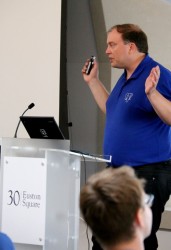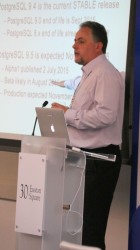PGDay UK – User Group meeting
PGDay UK took place at 30 Euston Square on July 7th. The location is perfect as it’s easy to get to via underground, buses or trains.
After the usual registration, refreshments, welcome and introductions came the long-awaited talk “Working in Open Source” by Liam Maxwell, CTO for Her Majesty’s Government. This talk was followed by Magnus Hagander, President of PostgreSQL Europe, who alerted us to the new key features of the next release which is now available in alpha and soon to be available in beta before the final version is released towards the end of the year. Some new key features include:
“Upsert” (INSERT … ON CONFLICT): 5 brings support for “UPSERT” operations.
BRIN (Block Range Indexes): BRIN stands for Block Range INdexes, and store metadata on a range of pages. At the moment this means the minimum and maximum values per block.
pg_rewind: pg_rewind makes it possible to efficiently bring an old primary in sync with a new primary without having to perform a full base backup.
Import Foreign Schema: with PostgreSQL 9.5, you can import tables en masse. You can also filter out any tables you don’t wish or limit it to just a specific set of tables
Inheritance with foreign table: Foreign tables can now either inherit local tables, or be inherited from.
David Kennaway showed us the challenges presented in a financial services environment and how PostgreSQL fits into the strategy at Goldman Sachs.
Mike Lujan from Manchester University talked to us about the AXLE project… but what is the AXLE project? AXLE, advanced analytics for extremely large European databases, brings together a diverse group of researchers covering hardware, database kernel and visualisation all focused on solving the needs of extremely large data analysis. The project partners are 2ndQuadrant, Barcelona Supercomputing Center, Portavita, the University of Ljubljana and the University of Manchester. The project, like PostgreSQL, is of course Open Source.
With “PostgreSQL Back Up and Recovery: Best practices and tools” by Devrim Gunduz, we discovered solutions for common issues along with pros and cons for each of them. There are of course many backup solutions – both open and closed source.
Gianni Ciolli gave us some “PostgreSQL Administration Recipes”. These recipes should enhance the user’s experience of PostgreSQL by making it speedier and more effective.
Marco Slot discussed the internals and performance of pg_shard and some of its latest features. pg_shard is a free, open source extension for scaling out PostgreSQL across a cluster of commodity servers.
In his “Fun Things to Do with Logical Decoding” Mike Fowler looked at trigger-less auditing, partial replication and full statement replication. Was that fun? I am not so sure!
The next talk had a great title – “The Elephant and the Snake” – could it be a story by Rudyard Kipling or one of Aesop’s fables? No, but Tony Locke told us how to connect from Python to PostgreSQL, including tips and tricks.
The day ended with a plea from Simon Riggs for users to upgrade and test the new 9.5 release to ensure the version is bug-free, helping the PostgreSQL community currently working on the 9.6 release and beyond.
With around 100 people attending the conference, PGDay UK 2015 was one of the most dynamic PosgreSQL meetings that I have ever attended. The audience was very diverse, coming from universities, big corporations, small companies and government institutions.
Thanks to the sponsors 2ndQuadrant, EDB, Brandwatch and CitusData, we were provided with good food and a drink reception at the end of the day.
Interested in PostgreSQL? Why not come to the PostgreSQL conference Europe 2015, which will take place in Vienna on October 27th to 30th? Hope to see you there!



Leave a Reply